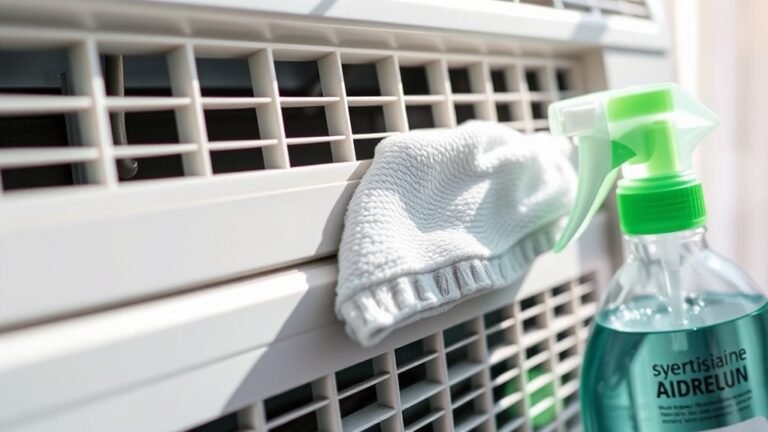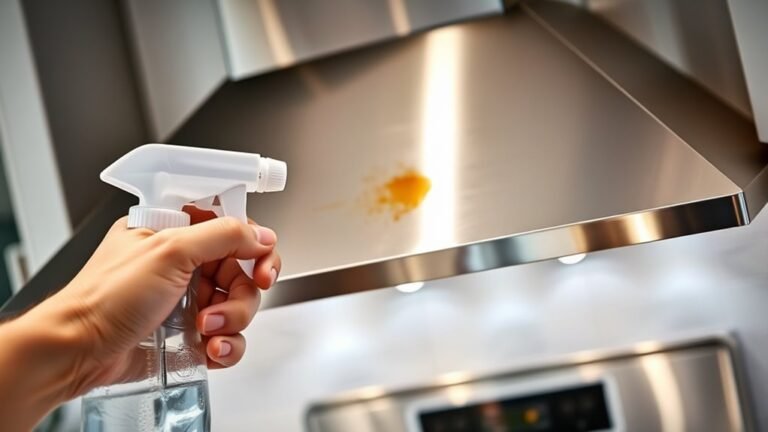Mistakes to Avoid When Cleaning Your Dishwasher
When cleaning your dishwasher, avoid harsh chemicals and abrasive tools that can damage seals and interior surfaces. Don’t neglect the filter or spray arms—they need regular rinsing to prevent clogs and residue buildup. Skipping routine maintenance, like drain and seal checks, lowers efficiency and may cause leaks. Also, cleaning just the exterior won’t keep the inside debris-free. If you want your dishwasher to work smoothly and last longer, it’s worth knowing these common mistakes and how to fix them properly.
Using Harsh Chemicals That Damage Dishwasher Components
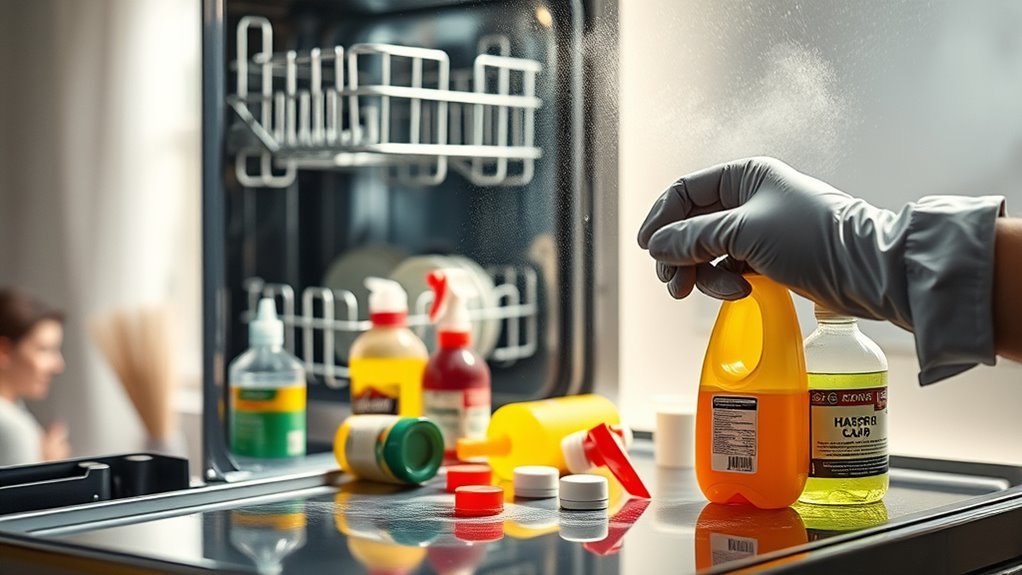
Although it might seem like a good idea to use strong cleaners to get your dishwasher spotless, harsh chemicals can actually damage its components. When you rely on these powerful substances, you risk triggering unwanted chemical reactions inside the machine. These reactions can accelerate component degradation, weakening parts like seals, racks, and the interior lining. Instead of freeing yourself from the hassle of cleaning, you might end up trapped by costly repairs or even a shortened dishwasher lifespan. You want your appliance to work efficiently and last long, not break down prematurely. Choosing gentler, dishwasher-safe cleaning solutions lets you maintain freedom from worry, preserving your machine’s integrity without exposing it to the harmful effects of aggressive chemicals. Keep your dishwasher clean and carefree by avoiding harsh cleaners.
Ignoring the Filter When Cleaning Your Dishwasher
While choosing gentle cleaners helps protect your dishwasher’s parts, neglecting the filter can cause just as much trouble. The filter traps food particles, preventing clogs and odors, so regular attention is key. Here are some filter maintenance tips and filter cleaning frequency guidelines to keep your dishwasher running smoothly:
| Task | Frequency | Benefit |
|---|---|---|
| Remove & rinse | Weekly | Avoid blockages |
| Soak in vinegar | Monthly | Break down residue |
| Inspect for damage | Quarterly | Guarantee filter integrity |
Ignoring the filter means risking poor water flow and dirty dishes. By sticking to these simple steps, you’ll enjoy freedom from breakdowns and hassle-free cleaning. Remember, a clean filter is the heart of a dishwasher that works like new!
Overlooking the Spray Arms and Their Nozzles
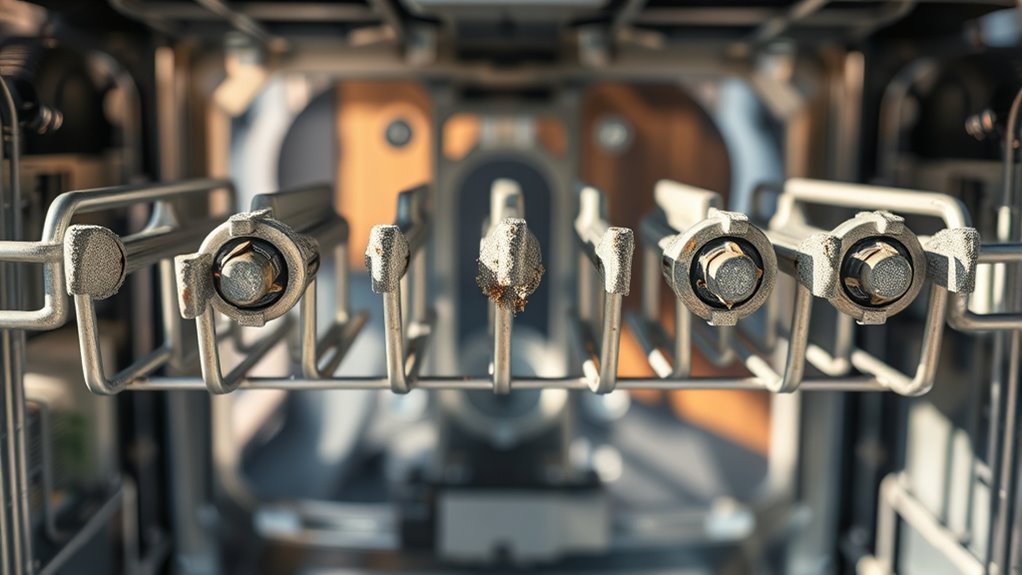
Two essential parts you shouldn’t overlook when cleaning your dishwasher are the spray arms and their nozzles. Neglecting spray arm maintenance can seriously impact your dishwasher’s performance. Over time, food particles and mineral deposits can clog the nozzles, leading to nozzle blockages that reduce water pressure and cleaning efficiency. To keep your dishwasher running freely, remove the spray arms regularly and rinse them under warm water. Use a toothpick or small brush to clear stubborn blockages from each nozzle. This simple step guarantees water sprays evenly, reaching every dish without restriction. By staying on top of spray arm maintenance, you avoid poor wash results and extend your dishwasher’s life—giving you more freedom to enjoy clean dishes without hassle.
Running the Dishwasher Empty Too Often
Anyone might think running an empty dishwasher is harmless, but doing it too often can waste energy and water. When you run your dishwasher without dishes, it lowers dishwasher efficiency and increases unnecessary water usage. To keep your dishwasher working freely and efficiently, avoid this mistake by:
- Waiting until the dishwasher is full before running a cycle
- Using eco or half-load settings if available
- Planning your dishwashing routine to minimize empty runs
- Regularly checking for smaller loads that can be combined
- Trusting that a full load saves both water and energy
Neglecting to Clean the Door Seals and Gaskets
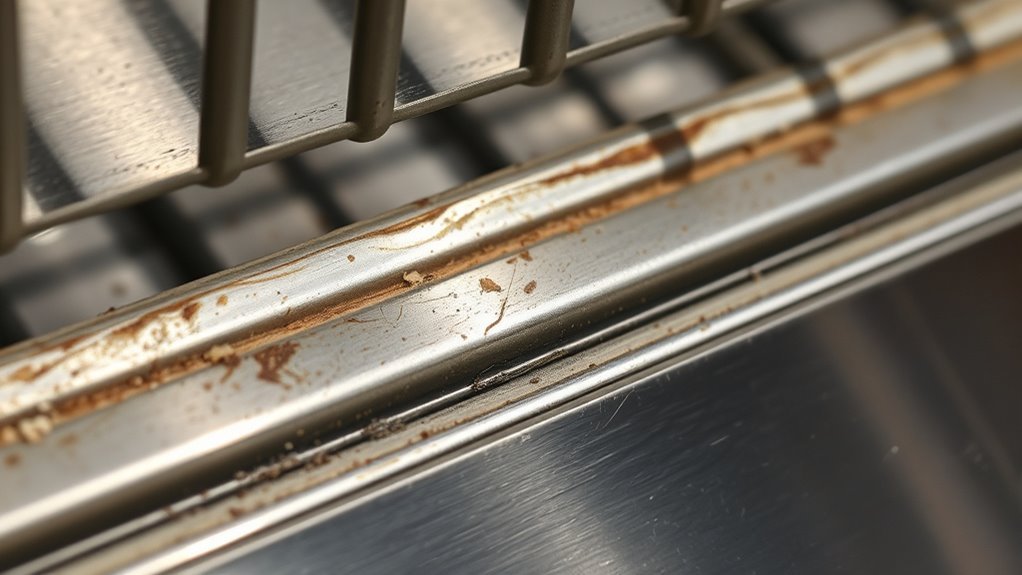
If you don’t regularly clean the door seals and gaskets on your dishwasher, grime and mold can build up quickly, leading to unpleasant odors and leaks. Skipping door seal maintenance not only compromises your dishwasher’s efficiency but also risks water damage in your kitchen. You want your appliance running smoothly without the hassle of constant repairs or foul smells. Make gasket cleaning part of your routine by wiping down these areas with a damp cloth and mild detergent every few weeks. Pay close attention to crevices where debris hides. Taking these simple steps frees you from worrying about hidden buildup and keeps your dishwasher airtight and leak-free. Remember, a clean gasket means a dependable dishwasher ready to handle your freedom-filled lifestyle.
Using Too Much or the Wrong Type of Detergent
Using too much detergent can leave residue and cause buildup, harming your dishwasher’s performance. You’ll also want to pick the right detergent type to avoid damage or poor cleaning results. Choosing wisely helps keep your appliance running smoothly and your dishes spotless.
Overusing Detergent Risks
One common mistake people make is adding too much detergent to their dishwasher, thinking it will clean better. But overusing detergent leads to detergent buildup and excessive suds, which can actually harm your machine and dishes. Too many suds interfere with proper rinsing, leaving residue behind and possibly causing leaks. Detergent buildup also clogs spray arms and filters, reducing cleaning efficiency over time.
Here’s what you risk when you overdo it:
- Residue on dishes and glassware
- Clogged dishwasher components
- Poor water drainage
- Increased wear on seals and gaskets
- Potential foul odors from trapped buildup
Keep your freedom from fuss by using detergent sparingly—it’s about quality, not quantity.
Choosing Proper Detergent
Choosing the right detergent is essential for keeping your dishwasher running smoothly and your dishes spotless. You’ve got several detergent types to choose from—powders, gels, and pods—each with its own pros and cons. Using too much detergent or the wrong type can reduce detergent effectiveness, leaving residues or damaging your machine. Don’t assume more detergent means cleaner dishes; it often clogs your dishwasher and wastes product. Instead, follow the manufacturer’s recommendations and match the detergent type to your water hardness and dishwasher model. This way, you maintain freedom from constant maintenance and avoid frustrating re-washes. Picking the proper detergent keeps your dishwasher efficient, your dishes shining, and your cleaning routine hassle-free. It’s a simple choice that empowers your daily freedom.
Forgetting to Regularly Clean the Drain
Anyone who overlooks cleaning the dishwasher drain regularly risks buildup that can cause clogs and unpleasant odors. When food debris accumulates, it blocks water flow and invites bacteria growth, limiting your dishwasher’s efficiency. Staying on top of drain maintenance means you avoid these hassles and keep your appliance running smoothly.
Regularly cleaning your dishwasher drain prevents clogs, odors, and keeps your appliance efficient and running smoothly.
To keep your dishwasher drain clear, remember to:
- Remove trapped food debris after each wash
- Check the drain filter weekly
- Flush the drain with hot water monthly
- Use dishwasher-safe cleaning solutions
- Inspect for any signs of slow drainage or odors
Skipping Routine Maintenance Checks
You can’t skip routine maintenance checks if you want your dishwasher to run smoothly. Ignoring filter cleaning, overlooking spray arm checks, and neglecting seal inspections can lead to poor performance and costly repairs. Make it a habit to stay on top of these tasks.
Ignoring Filter Cleaning
A clogged dishwasher filter can quickly turn a helpful appliance into a source of frustration. Ignoring filter cleaning means you’re risking poor wash results, bad odors, and even damage to your dishwasher. To keep things running smoothly, prioritize regular filter maintenance. It’s not just about cleaning; sometimes, filter replacement is necessary to maintain peak performance.
Here’s what you should keep in mind:
- Clean the filter monthly to prevent buildup
- Inspect for tears or damage during each cleaning
- Replace the filter if it’s cracked or excessively worn
- Avoid using harsh chemicals that can degrade the filter
- Consult your manual for specific filter care instructions
Taking these steps lets you enjoy a dishwasher that works efficiently and gives you the freedom to focus on what matters.
Overlooking Spray Arm Checks
Although they might seem minor, neglecting to check your dishwasher’s spray arms can lead to uneven cleaning and water flow issues. If you skip spray arm maintenance, leftover debris can cause nozzle blockage, reducing water pressure and leaving your dishes dirty. To keep your freedom from frustrating cleanings, regularly remove and inspect the spray arms. Clear any clogs with a toothpick or running water, ensuring all nozzles are free. This simple step saves you from wasting water and energy, and keeps your dishwasher running smoothly. Don’t let small oversights limit your dishwashing efficiency. Routine spray arm checks are key to maintaining the rinse power you rely on for spotless results, giving you more time to enjoy what matters most.
Neglecting Seal Inspections
Keeping your dishwasher’s spray arms clear is important, but don’t forget about the seals. Neglecting seal inspections can cause leaks and reduce efficiency, limiting your freedom from constant repairs. Regular checks help you spot trouble early and keep your dishwasher running smoothly. Here are essential seal maintenance tips to keep in mind:
- Inspect seals for cracks, brittleness, or warping.
- Clean seals with a soft cloth and mild detergent.
- Check for water pooling or dripping during cycles.
- Listen for unusual noises indicating seal issues.
- Replace seals promptly when you notice seal replacement signs like leaks or persistent odors.
Cleaning Only the Exterior Without Checking the Interior
While it might seem enough to wipe down your dishwasher’s exterior, neglecting the interior can lead to buildup and odors that affect its performance. You’ve got to do a thorough interior inspection to catch hidden debris stuck in corners or filters. Ignoring this means less efficient cleaning and potential damage over time.
| Exterior Cleaning | Interior Inspection |
|---|---|
| Looks clean and shiny | Reveals hidden debris |
| Easy and quick task | Requires more effort |
| Prevents surface stains | Guarantees peak function |
Don’t settle for just a polished outside. Freedoms come with responsibility—taking time to check inside keeps your dishwasher running smoothly and your dishes truly clean.
Using Abrasive Tools That Scratch Surfaces
When cleaning your dishwasher, avoid using abrasive tools like steel wool or harsh scrubbing pads. These can easily scratch and damage the interior surfaces, leading to rust or reduced efficiency. Instead, opt for gentle sponges or soft cloths to keep your dishwasher safe and clean.
Types of Abrasive Tools
Although abrasive tools might seem effective for tackling tough dishwasher grime, you should be careful because many of them can easily scratch surfaces. Knowing the types of abrasive materials and cleaning tools helps you avoid damage while keeping your dishwasher clean.
Here are common abrasive tools to watch out for:
- Steel wool pads, which can leave deep scratches
- Rough scouring pads with harsh fibers
- Metal brushes that scrape aggressively
- Abrasive powders that grind surfaces
- Hard-bristle brushes that wear down coatings
Choosing gentler alternatives lets you maintain freedom in cleaning without risking your dishwasher’s finish. Always test a small area first or opt for non-abrasive tools designed specifically for delicate surfaces. This way, you protect your appliance and enjoy hassle-free maintenance.
Effects on Dishwasher Surfaces
Using abrasive tools on your dishwasher might seem like a quick fix, but it can cause lasting damage to its surfaces. When you use harsh scrubbing pads or metal brushes, you risk scratching the interior and exterior, leading to surface damage that’s not only unsightly but can also compromise the dishwasher’s durability. These scratches create tiny grooves where dirt and grime can accumulate, making your cleaning efforts counterproductive. To keep your dishwasher in top shape, choose gentle cleaning materials like soft sponges or microfiber cloths. This way, you maintain freedom from worry about damaging your appliance and guarantee it stays efficient and looking great for years. Avoid abrasive tools—they do more harm than good when it comes to preserving your dishwasher’s surfaces.
Frequently Asked Questions
Can I Use Vinegar to Clean My Dishwasher Safely?
You can definitely use vinegar to clean your dishwasher safely, and it offers great vinegar benefits like cutting through grime and removing odors. Just pour a cup of white vinegar into the bottom and run a hot water cycle. It’s a natural, effective cleaning method that helps keep your dishwasher fresh without harsh chemicals. Just avoid using vinegar too often, as its acidity might damage rubber seals over time.
How Often Should I Run a Cleaning Cycle on My Dishwasher?
You should aim for a cleaning frequency of about once a month to keep your dishwasher running smoothly. Regular cleaning helps prevent buildup and odors, making maintenance easier and more effective. By sticking to this routine, you’ll enjoy hassle-free dishwashing without worrying about hidden grime. Just set a reminder, follow simple maintenance tips, and you’ll have the freedom to focus on what matters most without dishwasher troubles slowing you down.
Is It Necessary to Remove Racks Before Cleaning the Dishwasher?
Think of your dishwasher like a well-organized library—sometimes, you need to pull out the shelves to dust every nook. Yes, rack removal is a smart step before cleaning because it lets you access hidden grime and guarantees your cleaning techniques work their magic thoroughly. By freeing the racks, you’re giving yourself the freedom to clean every corner, keeping your dishwasher running smoothly and your dishes sparkling.
Can Leftover Food Particles Cause Bad Odors in the Dishwasher?
Yes, leftover food particles can definitely cause bad odors in your dishwasher. When food residue gets trapped, it starts to break down and create unpleasant smells. To keep your dishwasher smelling fresh, it’s important to regularly clean out those bits and focus on odor prevention. Taking a little time to rinse off dishes before loading and wiping down the interior can give you the freedom to enjoy a fresh, clean kitchen without any funky odors.
What Signs Indicate My Dishwasher Needs Professional Servicing?
If your dishwasher starts making unusual noises or you notice water leaks, it’s a clear sign you need professional servicing. You don’t want to be stuck with a broken appliance, so trust the experts to check for hidden issues. Ignoring these signs can lead to bigger problems, restricting your freedom to enjoy hassle-free clean dishes. Act early and keep your dishwasher running smoothly without any unexpected interruptions.


